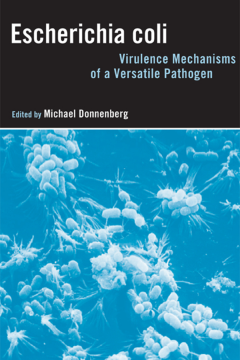
Additional Information
Book Details
Abstract
Although most strains of E. coli bacteria are harmless and live in the intestines of healthy humans and animals, several strains can produce powerful toxins and cause severe illness in humans. This versatile pathogen is best known for being transmitted to humans through contaminated foods — such as undercooked meat and unpasteurized fruit juice — and has attracts much attention when serious outbreaks occur.
E. coli is capable of causing a wide variety of diseases — from urinary tract infections to meningitis. A considerable amount of media coverage has recently been devoted to one particular strain of E. coli, responsible for an estimated 73,000 cases of infection and 61 deaths in the United States each year. Knowing more about the biology, the evolution, and the genetic basis of this pathogen is crucial to future prevention of infection and illness.
Pathogenic E. coli is a unique, comprehensive analysis of the biology and molecular mechanisms that enable this ubiquitous organism to thrive. Leading investigators in the field discuss the molecular basis of E. coli pathogenesis followed by chapters on genomics and evolution. Detailed descriptions of distinct strains reveal the molecular pathogenesis of each and the causes of intestinal and extra-intestinal infections in humans. Pathogenic E. coli concludes with a presentation of virulance factors, common to two or more pathotypes. This unique collection presents timely and vital information on understanding the inner workings of E. coli, which will lend key insights into disease prevention research.
- Single source of information of E. coli pathogenesis
- Expert authors
- Comprehensive coverage
- Molecular mechanisms
- Biology, evolution and genomics
- Recent advances
"...an excellent and valuable reference work of general interest to microbiologists, infectious disease specialists, and food safety experts..."-ASM NEWS (June 2003)
